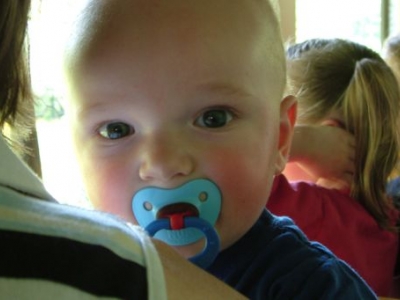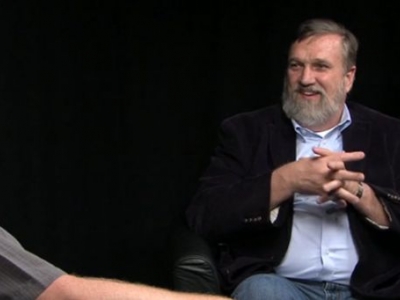
Teaching my children to hate me
“If anyone comes to Me and does not hate his own father and mother, wife and children, brothers and sisters ... he cannot be My disciple".
“If anyone comes to Me and does not hate his own father and mother, wife and children, brothers and sisters—yes, and even his own life—he cannot be My disciple. Whoever does not bear his own cross and come after Me cannot be My disciple.” Luke 14:26-27 (HCSB)
As a young and immaturely fervent Christian teenager, I loved this verse. Teenagers by nature are, both consciously and unconsciously, looking for ways to disassociate themselves from their parents and find their own identity through their peers and community connections. And for the Christian teen, here (it would appear) is biblical warrant to do just that while still being faithful to Jesus.
“Sorry Dad, can’t help you with the garden. I’ve got to go be a disciple of Jesus with my mates at church”.
“Sorry Mum, can’t stick around for family dinner. I’ve got to go listen to Christian rock music and think about how the lyrics impact my walk with the Lord”.
Contrary to my own exalted opinion, I don’t think I knew the implications of Jesus' words in any great depth. Clearly I needed (and continue to need) to understand how to put Jesus first, while still honouring my parents as Jesus also commands. Thankfully God gave me loving and gracious parents. And thankfully, God also continues to grow me in my maturity and understanding of his word.
Now that I’m married and have kids, the immediate context of application has changed. I need to learn to be a disciple of Jesus, while 'hating' my wife and kids. But then there’s the flip side of the verse. As a Christian parent raising Christian kids, I need to teach them, encourage them, and expect them to 'hate' me as they continue to learn to be Jesus’ disciples. Suddenly, I’m not as in love with this verse as I used to be.
What does 'hate' mean?
What does it mean for me to hate my kids? What does it mean to teach them to hate me?
We first need to wrestle with the meaning of ‘hate’. In regular usage, this would mean an intense dislike for the person or thing being hated. And sometimes, the Bible uses the word with this meaning in mind (e.g. Prov. 6:16-18). However, that simply cannot be the plain reading of Luke 14. The reason for this is the competing commands of the Bible for children to honour their parents (Ex. 20:12), husbands to love their wives (Eph. 5:25-26) and parents to loving raise their children (Eph. 6:4).
Tony Payne in his book Fatherhood offers this definition. “The Greek word…. can also mean the simple act of choosing between two options, so that one option is disadvantaged… To ‘hate’ in this sense, is simply to disadvantage or disregard or exclude something because you’ve chosen something else instead.”
This means that I need to make an active choice for Jesus, and against my family. My wife and my children will be ‘disadvantaged’ as I seek to live as a disciple to Jesus. It also means that if I truly want my kids to walk with Jesus as their Lord and Saviour, then I need to teach them to choose Jesus, even though that will disadvantage me.
What does this mean in practice?
Firstly, it doesn’t mean that I will seek to disadvantage my family. Jesus doesn’t call for me to actively seek the most disadvantageous situation for my wife and kids. This is not a call for neglect, or worse, abuse of my husbandly and parenting responsibilities. As noted above, it will often be the case that following Jesus and being obedient to his commands will necessarily involve loving my wife and caring for my kids.
However, hating my family will mean that I am a disciple first and a husband and father second. My first responsibility is to trust and follow Jesus, not my wife and not my kids. The concerns of my Heavenly
Father are to be my primary concerns, not the concerns of my wife and kids. I am not exclusively to seek after the pleasure, happiness and approval of my family, but only to the extent that those pleasures, happiness and approval are in step with the greater pleasure and glory of God.
And if this is what is true of me, then it is what I want to be true of my kids. I want my kids to be Jesus’ disciples first and a son and daughter second. I want to teach them the ways and knowledge of the
Lord, and this means teaching them to hate me. I need to teach my son and my daughter to follow Jesus, even if this means that our relationship as father and child is disadvantaged in some way.
While my children are young, the distinction between being a disciple of Jesus, and being my child will, God-willing, not be too distinct. If I’m doing my job well and seeking to be a godly father, then as I teach my children to read the Bible, pray, be active in church membership, play without fighting, be careful with language, explore their God-given gifts and skills in music, sport or academics, and have healthy relationships with others, then there shouldn’t be too much conflict between the two. Obeying Jesus and obeying dad should for the most part go hand-in-hand.
However, as they continue to grow and gain more and more independence, I will be seeking to give them more opportunities to express their faith in Christ, despite its possible disruption to our family life. It may be where they go to church, what they study at Uni, possibly interstate or international vocations. Of course I will help guide them towards wise decisions, but also godly ones (which are the wisest choices anyway), decisions that encourage their walk with the Lord, but may not necessarily encourage a geographic or relational proximity to me.
How do I do this? Like most issues in parenting it is going to be about my modelling this life to them. I want to model to my kids that I love them, care for them and protect them. I will lavish good gifts upon them and make sacrifices for them. However, I will also seek to model to them that being a disciple of Jesus is the most important aspect of my life. When I choose following Jesus over them, I will seek to make this clear to them and perhaps even take them with me on my discipleship walk.
I want to teach my children to hate me. In fact, I need to teach my children to hate me. Only in this way can they be Jesus disciple. Therefore, if my children hate me because they are walking in step with Jesus, then they have loved me in the best possible way.
For more articles from Growing Faith, subscribe to our monthly e-newsletter.
To hear about the latest books and resources from Youthworks Media, subscribe here.







